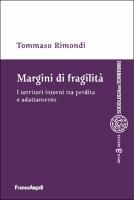Margini di fragilità
I territori interni tra perdita e adattamento
| dc.contributor.author | RIMONDI, TOMMASO | |
| dc.date.accessioned | 2022-07-06T15:13:11Z | |
| dc.date.available | 2022-07-06T15:13:11Z | |
| dc.date.issued | 2022 | |
| dc.identifier | OCN: 1348377783 | |
| dc.identifier.uri | https://library.oapen.org/handle/20.500.12657/57261 | |
| dc.description.abstract | The book focuses on the impact of climate change on the Italian inner areas as a privileged place to observe the ongoing environmental crisis. In the first chapter, the main stages through which sociology has approached climate change are discussed. Assuming loss as a dimension inevitably linked to climate change, the concepts of vulnerability and adaptation are established as the main research interests. A specific focus on the socio-spatial effects of climate change is needed in the inner areas: fragile territories showing vulnerabilities but also an important “green” capital. The Emilia-Romagna inner areas are then studied through a quantitative analysis at a municipal scale, identifying social, demographic and economic factors shaping fragility. The last section of the book focuses on the Delta del Po area in the province of Ferrara, and its conflictual relation with nature. Emphasizing the unstable human-environment relation that characterizes the area, the main features of the adaptation strategies adopted there to face the transformation caused by climate change are then analyzed. | en_US |
| dc.language | Italian | en_US |
| dc.relation.ispartofseries | Sociologia del territorio | en_US |
| dc.subject.other | Climate change, Adaptation, Inner areas, Fragility, Emilia-Romagna, Loss | en_US |
| dc.title | Margini di fragilità | en_US |
| dc.title.alternative | I territori interni tra perdita e adattamento | en_US |
| dc.type | book | |
| oapen.relation.isPublishedBy | e2ddfb5e-9202-4851-8afe-1e09b020b018 | en_US |
| oapen.pages | 144 | en_US |
| oapen.place.publication | Milan | en_US |
| oapen.remark.public | Funder name: Dipartimento di Sociologia e Diritto dell’economia dell’Università di Bologna |

